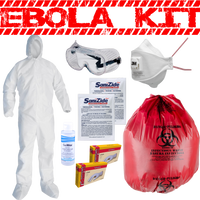CDC Approved Ebola Personel Protection Kits
Posted by Live Action Safety on 12th Oct 2014
Ebola is spread by contact with the fluids of someone who is infected with Ebola, including saliva, sweat, blood and vomit. No vaccine or cure is available. If you need to go near someone with the virus, use protective gear such as face masks and gloves. CDC recommends the following below.
Healthcare workers who may be exposed to people with Ebola should follow these steps:
- Wear protective clothing, including masks, gloves, gowns, and eye protection. View Live Action Safety Ebola Kit
- Practice proper infection control and sterilization measures. For more information, see “Infection Control for Viral Hemorrhagic Fevers in the African Health Care Setting”.
- Isolate patients with Ebola from other patients.
- Avoid direct contact with the bodies of people who have died from Ebola.
- Notify health officials if you have had direct contact with the blood or body fluids, such as but not limited to, feces, saliva, urine, vomit, and semen of a person who is sick with Ebola. The virus can enter the body through broken skin or unprotected mucous membranes in, for example, the eyes, nose, or mouth



